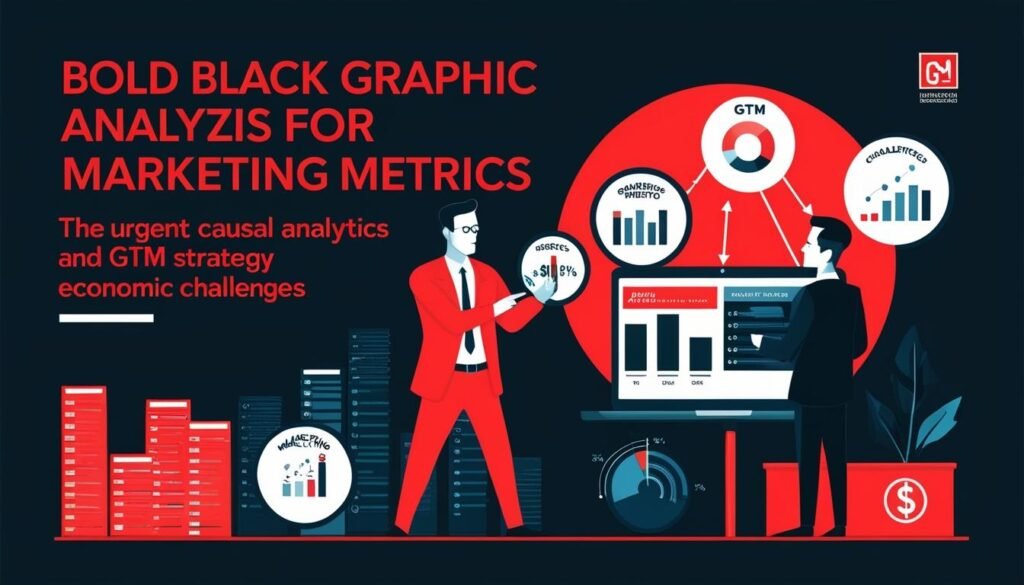As economic pressures and technological advancements reshape corporate landscapes, C-suite executives confront the need for clearer marketing impact and advanced analytics.
In the coming years, particularly 2025 to 2026, businesses are expected to face significant challenges, especially in go-to-market (GTM) functions. The implications of current economic pressures and technological advancements, notably in artificial intelligence (AI), are prompting a re-evaluation of marketing strategies and their costs within corporate structures.
According to an analysis published by MarTech, many C-suite executives currently possess limited insights into the high costs associated with marketing and are increasingly questioning the effectiveness and efficiency of their sales teams in the AI era. This uncertainty regarding expenditures is compounded by rising risks, labelled as ‘grey swans’, which denote anticipated but less visible challenges that could lead to serious consequences if not properly managed. Corporate leaders are aware that unexpected risks, termed ‘black swans’, can arise, thus necessitating a better understanding of their investments in GTM strategies.
At the root of this dilemma is a lack of clarity around the value that marketing brings to the table, particularly as organisations seek to maximise their return on investment. The commentary highlights a notable demand within the business community for advanced forms of marketing analytics, especially causal analytics. This sophisticated approach aims to measure marketing’s contribution to overall business performance with greater precision. C-suite decision-makers are increasingly showing impatience with conventional marketing metrics, asserting that they need causal analytics similar to those used to understand complex phenomena, including climate change.
As pressures mount, marketing leaders are urged to align their marketing strategies with business acumen. The publication underscores a critical competitive landscape where the ability to deliver returns that significantly exceed a benchmark internal rate of return (IRR)—currently around 4.5%—is essential. This figure represents the minimum performance threshold that any department must achieve to justify its budget.
The transition back to a budgetary business case is gaining traction among financial executives, who are favouring comprehensive plans that map out both the GTM investment landscape and expected returns across various timelines. This shift underscores a stark reality: departments unable to provide clarity on their impact risk facing drastic cuts to their budgets, potentially receiving only 50% of their proposed allocations. This dynamic compels departments, particularly marketing and sales, to consistently demonstrate their effect on value creation.
Furthermore, the article indicates that marketing has the potential to significantly enhance sales efficacy and resource efficiency. It notes that organisations with well-established GTM strategies can find marketing making sales approximately eight times more effective while simultaneously achieving a fivefold increase in resource efficiency. This synergy suggests that marketing spend not only drives sales performance but also yields benefits across other critical business aspects, such as talent recruiting, investor relations, and procurement.
As the pressures of 2025 unfold, companies may face heightened scrutiny on their GTM strategies. However, by the close of 2026, GTM teams are expected to emerge in robust positions, provided they can effectively articulate their contributions to the C-suite. Ultimately, success in this realm hinges on marketing’s capacity to demystify its role within the broader corporate ecosystem and to deliver clear answers about its impact on value creation. A focused approach to answering these questions may enable B2B marketers to mitigate perceived risks and demonstrate their critical role in navigating the future landscape of business.
Source: Noah Wire Services
- https://martech.org/2025-gtm-forecast-key-shifts-redefining-the-future-of-go-to-market-strategy/ – Corroborates the need for B2B marketing teams to adopt advanced analytics and processes, and the shift towards AI-enhanced teams and B2C marketing leaders in GTM strategies.
- https://martech.org/its-time-for-b2b-marketing-to-understand-its-gtm-role/ – Supports the idea that C-suite executives are questioning the effectiveness and efficiency of marketing and sales teams, and the importance of understanding the role of marketing in GTM strategies.
- https://martech.org/2025-gtm-forecast-key-shifts-redefining-the-future-of-go-to-market-strategy/ – Highlights the lack of clarity around the value marketing brings and the demand for advanced marketing analytics, including causal analytics.
- https://martech.org/its-time-for-b2b-marketing-to-understand-its-gtm-role/ – Explains the transition back to a budgetary business case and the need for departments to demonstrate their impact on value creation to avoid budget cuts.
- https://butteredtoast.io/blog/ai-impact-marketing-in-2025/ – Details how AI is transforming marketing, including predictive analytics, which aligns with the need for advanced marketing analytics and causal analytics.
- https://martech.org/2025-gtm-forecast-key-shifts-redefining-the-future-of-go-to-market-strategy/ – Discusses the importance of marketing aligning with business acumen and delivering returns that exceed the internal rate of return (IRR) threshold.
- https://martech.org/its-time-for-b2b-marketing-to-understand-its-gtm-role/ – Emphasizes the critical competitive landscape where departments must justify their budgets by demonstrating their impact on value creation.
- https://www.wsiworld.com/blog/the-future-of-marketing-strategy-5-predictions-for-2025 – Predicts the growth in incorporating AI for data-driven decision-making, which supports the need for advanced analytics in GTM strategies.
- https://butteredtoast.io/blog/ai-impact-marketing-in-2025/ – Highlights how AI can enhance sales efficacy and resource efficiency, aligning with the potential benefits of well-established GTM strategies.
- https://martech.org/2025-gtm-forecast-key-shifts-redefining-the-future-of-go-to-market-strategy/ – Notes the potential for marketing to make sales more effective and achieve significant resource efficiency, supporting the synergy between marketing and sales.
- https://martech.org/its-time-for-b2b-marketing-to-understand-its-gtm-role/ – Concludes that success in GTM strategies hinges on marketing’s ability to articulate its contributions to the C-suite and deliver clear answers about its impact on value creation.


